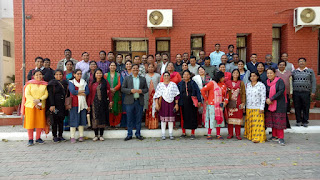Life Skills for Toddlers and Preschoolers:
1. You're stuck at home for the foreseeable future, so why not take that diaper off to try potty training.
2. Timely, and topical: Teach toddlers how to wash their hands for 20 whole seconds.
3. Even toddlers can learn how to sort toys and clean up.
4. While you're not going anywhere or in a rush, let little ones pick out their wildest outfits and dress themselves!
5. Fill up the watering can and water the plants together.
6. Lighten your laundry chores by having kids play "match the socks."
7. Work on learning how to snap, zip, or button jackets.
8. Let them wash their own faces.
9. For preschoolers: Take the time to teach them your phone number and address.
10. Show them how to dial 9-1-1 after discussing what sort of emergency necessitates it.
11. Enjoy the spring air and teach them how to master pedaling a tricycle or bike with training wheels.
Life Skills for Early Elementary School Students
12. Make good use of their YouTube obsession by showing them this video that teaches how to tie shoes.
13. Hand over the feather duster and let them chip in with the cleaning.
14. Similarly, teach them to sweep.
15. Or, show them how to vacuum.
16. Have them help with dinner prep by setting the table...
17. ...And clean up when it's time to clear the table.
18. Engage them in laundry day by teaching them how to separate the clothes by color.
19. Take the training wheels off and conquer two-wheeled solo bike riding.
20. Teach them how to make a simple sandwich for their lunch ... and yours!
21. Get a little help with garbage duty by teaching them how to take the trash out.
22. Show them how to properly wash the windows or the bathroom mirrors. Most will love to wield the Windex bottle.
23. Share basic sewing skills.
24. Let them fetch the mail.
25. Clear out the piggy bank and roll coins or teach them how to make change. (Bonus math lesson!)
26. Got any analog clocks in your house? Now's the time to learn how to tell time.
27. School them on basic first-aid skills.
28. Set them free with a recipe for no-bake cookies.
29. Let them grate cheese for homemade mac-and-cheese or taco night. Watch those fingertips as they work.
30. Show them how to make a bed.
31. Once the laundry is washed and folded, let the kids put it away.
Life Skills for Teens:
32. Look at a map and teach them how to read it—without the help of Google.
33. Get them a cursive writing book or download some worksheets.
34. Show them how to clean the bathroom, toilets and all.
35. Let them load the dishwasher after dinner.
36. Same goes for the laundry machine! They should be able to take over this chore with some help.
37. Teach them basic kitchen skills using the stove: scrambled eggs are a great place to start.
38. Another tasty option: grilled cheese.
39. Set them loose with a basic baking recipe. They might need some help getting it in and out of the oven, but should be able to measure and mix!
40. Set them up with a typing program. Keyboarding Without Tears is offering its program for FREE right now. Typing.com is another FREE online resource.
41. Pen an old-fashioned letter to friends or family, then show them how to add a stamp and mail it.
42. Teach them how to do their own hair: simple braids and ponytails should be easy at this age.
43. Show them how to properly wrap a present.
44. Teach them how to create a calendar or daily schedule and help them stick to it.
45. Stocking up on essentials? Let them handle the money and count the change.
46. Let them learn basic knife skills in the kitchen, cutting soft fruits. Even better if you have a kid-sized knife set.
47. Banks are still open; why not start a savings account for your kid and teach them to make a deposit.
48. Build some STEM skills and teach them to make an iMovie.
49. Put them to work in the yard: rake leaves or mulch, plant flowers, and pull weeds.
50. Show them how to add their events to your shared family calendar, whether it hangs in the hallway or lives on the internet.
Life Skills for Teens:
51. Teach them how to tie a tie. My son learned on YouTube.
52. By now, they should be able to sort, wash, and fold the laundry.
53. Take a night off: Let them cook a full meal and clean up when they're done.
54. Teach them how to properly iron out wrinkles.
55. Impart some basic car maintenance skills, like how to check the oil and change a tire.
56. Take them to the gas station when you need to fill up and let them do it.
57. Show them how to plunge a clogged toilet.
58. Teach them how to make and stick to a budget.
59. Help them open a checking account.
60. Teach them how to keep track of important papers ... like their new checking account records!
61. School them on how to write a professional email. No shorthand or emojis allowed.
62. Help them craft their first resume.
63. Have them memorize their social security number.
64. Power up the lawnmower and let your teen tackle the chore.
65. Nearing 18? Make sure they know how to register to vote!









































